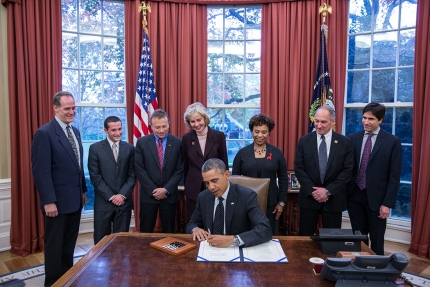HIV Organ Policy Equity (HOPE) Act is Now Law
President Obama’s National HIV/AIDS Strategy calls for aligning HIV-related laws and policies to be consistent with the most recent scientific evidence. Today, we took a step forward in that direction when the President signed into law the HIV Organ Policy Equity (HOPE) Act, bipartisan legislation that updates regulations from 1988 to reflect our advances in understanding and treating HIV. The President issued the following statement on this important legislation:
Earlier today, I signed into law the HIV Organ Policy Equity (HOPE) Act, a bipartisan piece of legislation that allows scientists to carry out research into organ donations from one person with HIV to another. For decades, these organ transplants have been illegal. It was even illegal to study whether they could be safe and effective. But that policy has become outdated. Our country has come a long way in our understanding of HIV and in developing effective treatments. And as our knowledge has grown, the possibility of successful organ transplants between HIV-positive people has become more real. The HOPE Act lifts the research ban. In time, it could lead to these organ donations for people living with HIV. And that, in turn, would help save and improve lives and strengthen the national supply of organs for all who need them.
Improving care for people living with HIV is critical to fighting the epidemic, and it’s a key goal of my National HIV/AIDS Strategy. The HOPE Act marks an important step in the right direction, and I thank Congress for their action.
Grant Colfax, MD is the Director of the Office of National AIDS Policy.
White House Blogs
- The White House Blog
- Middle Class Task Force
- Council of Economic Advisers
- Council on Environmental Quality
- Council on Women and Girls
- Office of Intergovernmental Affairs
- Office of Management and Budget
- Office of Public Engagement
- Office of Science & Tech Policy
- Office of Urban Affairs
- Open Government
- Faith and Neighborhood Partnerships
- Social Innovation and Civic Participation
- US Trade Representative
- Office National Drug Control Policy
categories
- AIDS Policy
- Alaska
- Blueprint for an America Built to Last
- Budget
- Civil Rights
- Defense
- Disabilities
- Economy
- Education
- Energy and Environment
- Equal Pay
- Ethics
- Faith Based
- Fiscal Responsibility
- Foreign Policy
- Grab Bag
- Health Care
- Homeland Security
- Immigration
- Innovation Fellows
- Inside the White House
- Middle Class Security
- Open Government
- Poverty
- Rural
- Seniors and Social Security
- Service
- Social Innovation
- State of the Union
- Taxes
- Technology
- Urban Policy
- Veterans
- Violence Prevention
- White House Internships
- Women
- Working Families
- Additional Issues


